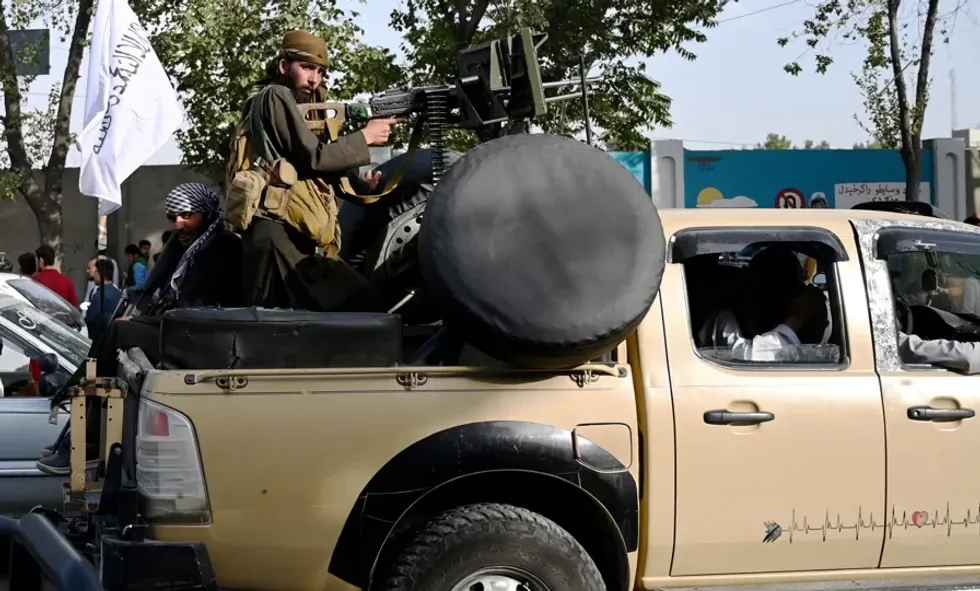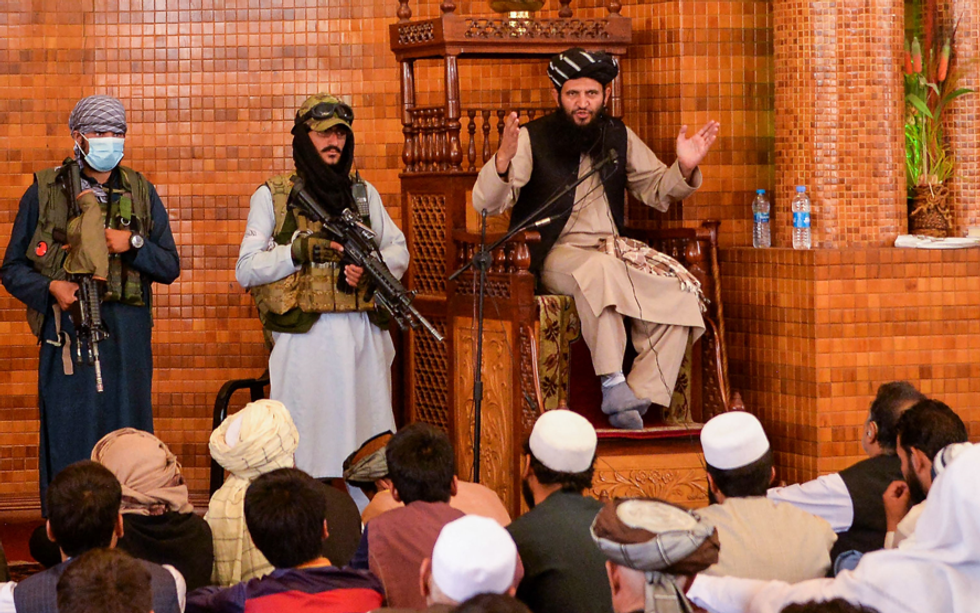BRITAIN’S top counter-terrorism police officer has warned that Afghanistan will again become a base for exporting terrorism, and predicted lone-wolf attacks “probably within two years”.
In an exclusive interview with Eastern Eye, assistant commissioner at the Metropolitan Police, Neil Basu, said the Taliban take-over in Afghanistan earlier this month will likely lead to terror attacks abroad.
Basu is head of specialist operations and the national lead for counter-terrorism policing in the UK. He is currently on secondment to lead the “Strategic Command Course” at the College of Policing.
Earlier this month, the Taliban ended two decades of war with an astonishingly swift rout of government forces after US president Joe Biden pulled out nearly all American troops from Afghanistan, following through on a deal struck with the movement by then-president Donald Trump in February 2020.
Asked how the Taliban’s take-over of Afghanistan will affect the UK’s security, Basu said, “It’s impossible to predict. I don’t care how good an intelligence analyst you are, you won’t know the long-term ramifications of this.
“But this is a classic case of societies not learning from history. We know what happened 20
years ago. We know what happens with failed states. We know the climate it creates.
“We know the extremism and radicalisation it creates in the younger generation. We know that’s a breeding ground for terrorism. And we know they don’t want to keep that within their borders, they want to expand. Now we know all of these things.
“Why would it not be obvious that we are going to see exactly the same thing happen again?”

The Taliban have repeatedly claimed to be different from their 1990s incarnation, and have declared an amnesty for Afghanistan government forces and officials.
However, an intelligence assessment conducted for the United Nations said militants were going door-to-door hunting former government officials and those who worked with US and Nato forces.
Basu set out a best and worst-case scenario. He said, “The best case scenario is unrealistic. But if you want me to be highly optimistic, it would be the Taliban allowing some power-sharing within a Taliban-controlled government.
“It would be allowing some of the progress of the last 20 years to remain – education of women and girls, freedom of speech and free media.
“I don’t believe any of this is going to happen, by the way, but that would be the best-case scenario with the Taliban being interested in an international relationship.
“It would have to partner with China, Russia, and Pakistan. Those countries are rational actors. They don’t want to create a world war. They are not North Korea.
“The best-case scenario is the four of them having an uneasy alliance, but keeping stability and peace in that part of the world so it doesn’t export terrorism wider. And of course, that’s in their interest because Afghanistan is on their border. People will be moving through their borders – those that they would not want in their own society.
“So it is in their interest to keep peace and that is the best-case scenario.”
On Tuesday (24), it emerged that Russian president Vladimir Putin discussed the situation in Afghanistan in a phone call with India’s prime minister Narendra Modi.
In a statement, the Kremlin said both leaders agreed to establish a permanent channel for bilateral consultations on Afghan developments.
Russian foreign minister Sergei Lavrov said on Tuesday that Russia, China, the United States and Pakistan are interested in serving as mediators in resolving the crisis in Afghanistan.
“We remain committed to the task of establishing peace and stability on Afghanistan’s territory so that it poses no threats to the region,” Lavrov said.
Meanwhile, leaders of the Group of Seven (G7) countries – Britain, Canada, France, Germany, Italy, Japan and the US – met virtually on Tuesday to discuss the crisis.
The UK prime minister Boris Johnson pushed president Joe Biden unsuccessfully for an extension to the August 31 evacuation deadline.

The Taliban have said they will stop Afghan nationals from going to the airport, but the G7 leaders are insisting on safe passage for them beyond next Tuesday’s (31) deadline, as well as “no-lurch back” on girls’ education.
Biden faces growing pressure to negotiate more time for the airlift of thousands trying to flee the country.
According to Basu, “The worst-case scenario is a collapsed state, a civil war, a Northern Alliance part two, and another implosion like Syria. And the result of that will be the expansion and exporting of terrorism worldwide.”
If the Taliban reverted to its 1990 version, “which was a despotic and horrific, medieval regime, clearly we shouldn’t recognise them in those circumstances”.
Basu outlined how the Taliban’s takeover could influence those already inclined to terrorism: “My worries haven’t changed from six weeks ago when I was still in the chair. My concern is still the inspiration of terrorism worldwide.
“And, of course, those individuals who have already crossed the Rubicon, having decided that they are effectively violent people willing to commit violent acts, acting individually, because they have been inspired by what’s happened.
“The Taliban victory – because that’s what it looks like from where I’m sitting – is a massive inspiration and source of comfort for people who might want to commit atrocities.”
Next month marks 20 years since the September 11 atrocity in the US. Basu voiced his concern about individuals, rather than groups, planning another elaborate 9/11 attack.
“That’s not my immediate concern,” he said. “My immediate concern is self-initiating terrorists, as they now call those lone actors who will be looking at this and saying, ‘Yeah, I want to support that. So let’s have another go.’
“My colleagues are watching a lot of those people as we speak. But my concern is always the ones you can’t see.”
Such attacks could take place in the UK, Basu said, adding, “but particularly some European countries like France and Belgium have been hit very hard.
“Europe has suffered from this kind of inspired rather than directed attack for years. There’s no doubt whatsoever that the original military action in Afghanistan and, to a lesser extent, in Iraq – whatever we think about the start of the war – definitely suppressed the ability to plot, plan and travel across borders to carry out operations.
“But what happened in 2017 in this country has largely been inspirational rather than directed. That will carry on. And I do think there are untold problems that have come from two years of the global pandemic and what that’s done to the stability of certain individuals.”
Basu’s counter-terrorism duties are being looked after for the time being by a colleague. Asked if Afghanistan required his personal attention, he said: “There’s a very experienced assistant commissioner called Matt Jukes, who has stepped in to cover my role while I’m away.
“My successors will be going through this (what is happening in Afghanistan) for years to come.”
Basu also referred to “a very good paper” on Afghanistan written by an academic at the London School of Economics, Dr Sajjan Gohel, who is considered a leading authority on international terrorism.
He described Gohel’s analysis as “incredibly insightful” and said: “It does talk about the timeline leading to what will inevitably become a base where terrorist attacks can once again be plotted against the West. And I predict probably within two years, that’s exactly what will happen.”
Teaching the best and brightest to be leaders
NEIL BASU has taken the rest of the year off from his normal job while he is on secondment to lead the “Strategic Command Course” at the College of Policing, an institution which prepares the brightest and the most talented officers for the most senior ranks in the service.
Basu, who took over his new teaching responsibilities on July 5, expects to be away from Scotland Yard until January or February next year.
When his appointment was announced earlier this year, Bernie O’Reilly, interim College of Policing CEO, said: “His extensive operational experience across a range of areas of policing, and his varied career over four decades in the service, means that he has all the qualities and skills needed to lead the course.”
Basu recalled at the time: “I passed the course in 2012 and I know that it has shaped my approach to senior police leadership ever since. I hope to be able to play my part in inspiring the next cohort of senior police leaders as they approach this major new stage in their careers.”
He told Eastern Eye: “It’s the number one police leadership course in the country. If you want to be a chief officer, an assistant chief constable or commander, or above, you have to pass this course. You have to go on two day incredibly tough selection events to even be considered for the course.”
The aim, he said, “is to take talented senior leaders who have been brilliant operationally, who are bright and have the intellectual horsepower to do the job, and refine them into a finished article”.
It teaches leaders to be more “reflective” and learn from mistakes.
Basu said, “Counter-terrorism policing is the greatest example of that. We have had 12 terrorist attacks (in recent years) and 500 recommendations.”
The continuing attempts to achieve diversity in the police force also feature “massively” on the course.
He said: “I’ve got a speech that I’ve given to hundreds of organisations, called Me, race and policing, which is about my journey as a mixed-race man through policing.”
(With agencies)

















 Kap’s Cafe in Surrey was struck by gunfire late at night with staff still insideInstagram/
Kap’s Cafe in Surrey was struck by gunfire late at night with staff still insideInstagram/ Kaps Cafe Instagram Story Instagram Screengrab/
Kaps Cafe Instagram Story Instagram Screengrab/ Kaps Cafe Instagram Story Instagram Screengrab/
Kaps Cafe Instagram Story Instagram Screengrab/

